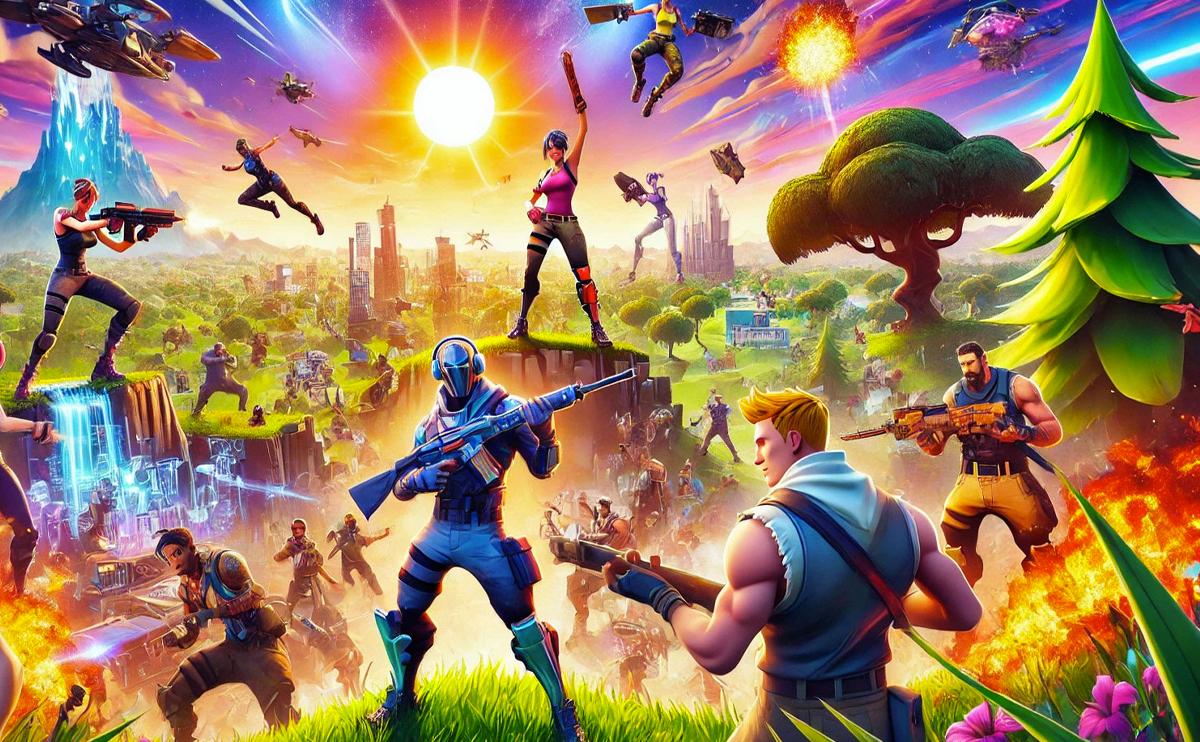Fortnite is not just a game; it’s a global phenomenon that has transformed the gaming landscape and deeply influenced pop culture. Since its launch in 2017, Fortnite has become a household name, uniting millions of players across the globe through its creative gameplay, groundbreaking events, and vibrant community. But how did a free-to-play battle royale become a cultural juggernaut? Let’s dive into Fortnite’s history and explore its immense cultural impact.
The Origins of Fortnite: A Bold Gamble
Fortnite began as a co-op survival game, “Fortnite: Save the World,” launched by Epic Games in July 2017. The initial concept involved players teaming up to build fortifications and defend against zombie-like creatures. While innovative, it was not an immediate hit.
Everything changed later that year when Epic introduced Fortnite: Battle Royale in September 2017, inspired by the rising popularity of games like PlayerUnknown’s Battlegrounds (PUBG). Unlike its predecessor, the battle royale mode was free-to-play and focused on a last-player-standing format where 100 players fought for survival on an ever-shrinking map. This mode skyrocketed in popularity, thanks to its accessible gameplay, whimsical design, and community-driven updates.
A Revolution in Gaming
Fortnite didn’t just join the battle royale genre—it redefined it. Several key factors contributed to its success:
- Cross-Platform Play: Fortnite broke down barriers by allowing players on different devices (consoles, PCs, and even mobile phones) to play together seamlessly.
- Constant Innovation: Epic Games consistently updated Fortnite with new features, maps, and game modes, keeping players engaged with a fresh experience.
- Creative Mode: Introduced in 2018, Creative Mode empowered players to build custom maps and games, showcasing their creativity in a way few other games allowed.
- Free-to-Play Model: Its free price tag, supported by cosmetic purchases, opened the doors for millions of players worldwide to join the fun.
Fortnite’s Impact on Pop Culture
Fortnite didn’t just change gaming; it became a cultural touchstone.
- Celebrity Crossovers: The game bridged the gap between gaming and mainstream culture by collaborating with artists, athletes, and brands. Iconic moments include:
- Travis Scott’s Astronomical Concert: A live in-game performance attended by over 12 million players.
- Ariana Grande’s Rift Tour: An immersive, interactive concert experience within Fortnite’s universe.
- Viral Dances: Fortnite’s emotes, particularly its dances, became instant sensations. Moves like the Floss, Orange Justice, and Electro Shuffle transcended gaming, appearing in music videos, TV shows, and even NFL touchdown celebrations.
- Crossover Galore: Fortnite partnered with franchises like Marvel, Star Wars, and DC Comics, bringing beloved characters like Spider-Man, Darth Vader, and Batman into its universe. These collaborations not only thrilled fans but also demonstrated Fortnite’s ability to blend gaming with film, television, and comics.
The Fashion of Fortnite
Fortnite’s influence extends into the world of fashion, both in-game and in real life.
- Skins as Self-Expression: In Fortnite, players can customize their characters with hundreds of skins, ranging from silly (Peely, a walking banana) to fierce (The Foundation). These skins allow players to express their identity, mood, or favorite pop culture references, transforming the game into a virtual runway.
- Real-World Fashion Collaborations: Fortnite’s collaborations with brands like Balenciaga and Nike brought its aesthetic to physical clothing lines, making it a pioneer in blending gaming and high fashion. The result? Hoodies, sneakers, and jackets that fans could wear IRL while staying true to the game’s colorful and edgy vibe.
Fortnite as a Social Platform
One of Fortnite’s most groundbreaking achievements is its evolution into a virtual social hub.
- Shared Experiences: Fortnite’s live events, such as the destruction of Tilted Towers or the Black Hole that marked the end of Chapter 1, brought millions of players together in real time. These moments were not just gameplay—they were shared cultural events.
- The Metaverse Vision: Fortnite has positioned itself as a precursor to the metaverse, blending social interactions, entertainment, and gaming into a single platform. Whether attending a virtual concert, exploring a custom map, or simply hanging out with friends, Fortnite offers more than just traditional gaming.
Why Fortnite Has Staying Power
Fortnite’s longevity can be attributed to its adaptability and commitment to its community. Epic Games continuously listens to player feedback, introducing features that reflect player desires while pushing the boundaries of what’s possible in gaming. Its seasonal storytelling, ever-evolving map, and creative collaborations keep players coming back for more.
Celebrating Fortnite’s Legacy Through Merchandise
Fortnite’s cultural significance is celebrated through its extensive range of merchandise, from clothing and accessories to home décor. These items allow fans to bring their love for Fortnite into their daily lives, whether by wearing a Drift hoodie, decorating their gaming setup with Fortnite posters, or gifting a Llama plushie to a fellow fan.
Conclusion: More Than a Game
Fortnite’s history is a testament to its ability to evolve, inspire, and unite people around the globe. From revolutionizing gaming to shaping fashion and pop culture, Fortnite has proven itself to be much more than a game—it’s a cultural icon.
Whether you’re reliving iconic moments, customizing your avatar, or bringing the Fortnite vibe into your real-world wardrobe, the game continues to offer new ways to connect and express yourself.
Want to celebrate your Fortnite fandom? Explore our collection of premium Fortnite-inspired merchandise and take home a piece of this cultural phenomenon today.
If you like this article, feel free to also check this one.

